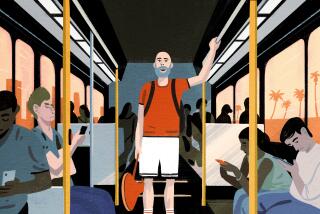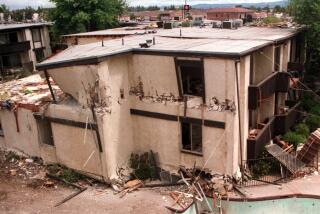Bus Ride Can Awaken the Senses in Tibet
- Share via
The best way to regard a trip on a Tibetan bus is as a mystical journey. Otherwise, it is enough to provoke a saint.
It begins when the “unorganized traveler” (the Chinese government’s apt term for the solo tourist) finally tracks down the bus ticket office in the dim recesses of a tiny, crowded bicycle shop on Lhasa’s main street.
Buying a $30 ticket to Shigatze, Tibet’s second-largest town, is like placing a bet in a Chinese gambling den. Wildly gesticulating Chinese and Tibetans, cigarettes bobbing from their lips, vie for reserved seats on the buses.
I shout affirmatively, “Shigatze!”, pointing to a calendar date. The English-speaking agent translated an illegible ticket: This squiggled number was the departure date, that was the number of the bus, another was the seat assignment, and the final number was the 7 a.m. departure. “Beijing time,” he reminded. All time in China is Beijing time.
At 6 a.m. it is dark in Lhasa and and there are no pedicabs. The mile walk from my hotel through the scrapping and yelping dog packs to the appointed bus stop at the foot of the Potala reminded me of the old Tibetan saying, “Where there is reverence, even a dog’s hind leg brings Enlightenment.”
Reputed to be the reincarnations of former monks who didn’t make it in their bipedal lifetimes, the dogs lounge all day at the gates to the Potala, perhaps waiting for the Dalai Lama to return to his winter monastery-palace after his flight from the Chinese occupying armies in 1959.
All Aboard for Shigatze?
It’s 6:30 a.m. A crowd has collected in the chill of dawn. Tibetans in folk costumes wait quietly while some blue-clad Chinese squat on the curb, chopsticking noodles from breakfast bowls.
Six dilapidated buses pull up. None has a number. As the crowd swarms in panic, the bus doors open and the people shove their way inside. I shout, “Shigatze?” and point at a dirty green bus. Someone nods. I force my way to the driver and ask, “Shigatze?”
He looks at me, shrugs and spits out the window. As I grab his lapels and shake him for an answer, he merely averts his eyes and spits again.
I scramble off the bus and repeat the routine until there is a consensus of nods and I’m shown to a narrow seat of collapsed black vinyl, which two Chinese men and I will share. There is room for only one of my pelvic bones.
At 7:30 a.m. the crowded bus coughs, then strains its way inscrutably to a large bus station two blocks from my hotel, causing a vast commotion among the passengers, with much seat-changing.
At 8:30 a.m. we wobble heavily away from the station. Everyone relaxes and seems satisfied. Cigarettes are popular and the air inside
the bus turns milky-blue. People cough and spit, and my seatmates open sacks of peanuts, tossing the shells into my lap.
Directly in front of me a gray-haired woman with two red-ribboned pigtails dangling from under a crumpled hat opens the window, which blows frost. People wrap up in hats and scarfs. I put on my bandanna and gloves and huddle under my blanket of peanut shells.
The road winds down the gray rocky valley alongside a silvery river. Stark stone mountains dusted with snow rise steeply into the clouds. We pass a 20-foot, brightly colored Buddha painted on the roadside cliffs and are overtaken by many olive-drab Chinese army trucks.
At 9:15 a.m. a Chinese soldier carrying a machine gun inspects the bus. No one speaks or moves.
At 9:25 a.m. the yellow silk fringe above the windshield wiggles as the bus rattles past mud-walled clusters of flat-topped roofs lined with brushwood and yak dung.
Colorful prayer flags waft their invocations into the cold wind to blow past giant earthenware incense burners, past shaggy yaks plowing ocher fields, past gray moraines and snowcapped peaks to the brilliant blue heavens.
Everyone Is Quiet
At 10 a.m. an old woman, as wrinkled as the tan landscape, twirls her silver prayer wheel and stares ahead. Everyone is quiet. We strain to see the dirt road climb upward into the sky, past Stone Age villages perched on green piano-key terraces.
I look out the crack under the exit door and see clouds below the road’s edge. We are to drive across a built-up ledge, then across thin air. Farther on, a road crew of Tibetan women supervised by a Chinese man lean on their shovels as we pass.
The old bus almost tiptoes across the landslide’s narrow track, scraping against a room-size rock. If it slips, I make my plans to jump.
At 11:30 a.m. one of my seatmates eats several apples and drops the cores on my foot.
By now our lives are concentrated on this traveling garbage heap with its kaleidoscopic images out the windows: mountain waterfalls, ruined monasteries overlooking deep canyons, farm women harvesting barley, plus herds of sheep, yaks and dzos (hybrid of a yak and cow).
Voice Like a Violin
It’s 12:30 p.m. Our brave motor roars as the driver adjusts a knob on a tank behind his seat.
A Tibetan woman sings sweetly, violinlike. A Khampa tribesman lowers his window, leans out and bellows a fierce Tarzan song as we near the 17,000-foot pass.
At the summit we see pyramids of stones topped by fluttering prayer flags. Passengers shout, “Lah-so!”, doffing their caps. They are thanking the gods for safe passage.
Scanning the precipitous decline ahead, I think the sentiment is premature; I continue with my plans to jump or to at least hang from the ceiling, should the bus fall over and toss passengers about. I am also considering settling permanently in Shigatze.
At 1:15 p.m. at the bottom of the valley the bus wallows and gets stuck in a mud trough. Passengers dismount and evacuate while the bus is pulled out by a truck.
At 2 p.m., behind us, horns sound steadily and the Chinese International Travel Service vans pass us on a curve, leaving us in a cloud of dust. We are uniformly colored beige. A young Chinese in a Mao suit is blowing bubble gum.
Lunch stop at 3 p.m. The restaurant is a concrete room lined with black oil drums and wooden tables. The fare of the day resembles hot slime over noodles. I eat my hiker’s mix.
At 4:30 p.m. a flat tire.
By 5:45 p.m. the passengers have lapsed into silent paralysis as we go up and down mountains and valleys. One’s thoughts turn to life and death. Mostly death.
The bus stops on a steep grade, billowing smoke. Thousands of feet below, clouds float over barren river canyons. The driver dashes water on the radiator and the motor revives. It sputters and we begin to roll backward, then pull forward. People mumble what I take to be prayers.
Dotted With Flowers
At 6:15 p.m. blinding white glaciers tumble like frozen volcanic flows. In the distance a monk slides down a steep moraine path. The alpine turf is dotted with blue flowers. There are silver rivers, clouds, more mountains and rocks.
By 10 p.m. the bus roars into the night. People are asleep. My seatmates are identified by their glowing cigarette tips. I do not care if they flick their ashes in my lap, for all is vanity.
I do not care that I am covered with dust, for I am born of the earth. I do not care that we have finally reached Shigatze, taking 18 hours to travel about 250 miles, for we have all reached supra-mondaine consciousness. No one can move.
Perhaps the old Tibetan saying could be updated to say: “Where there is veneration, even a Tibetan bus trip brings enlightenment.”
More to Read
Sign up for The Wild
We’ll help you find the best places to hike, bike and run, as well as the perfect silent spots for meditation and yoga.
You may occasionally receive promotional content from the Los Angeles Times.






